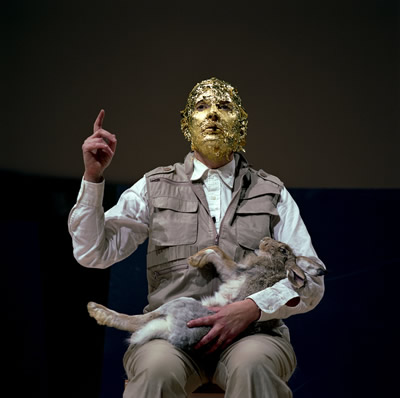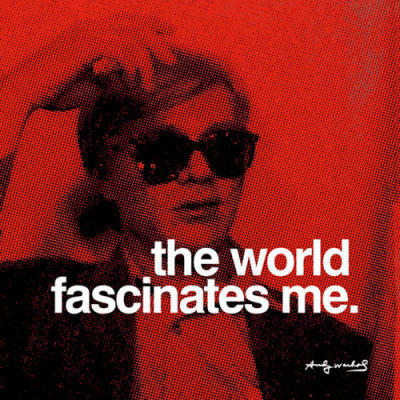
This week I took a closer look at Joseph Beuys by reading short biographies, watching John Halpern's Joseph Beuys-Transformer, and even his pop music video. I have to say that I am a bit mystified and perhaps a bit surprised I didn't know more about the man. He certainly is an enigmatic entity, but I do not know for sure how I feel about his ideas. There is something very troubled and guilty about his person that is probably mostly the result of his war-torn past. I wonder what direction his artistic ideas would have taken if he had not been in the German army during the Nazi reign of terror. In what ways would his ideas have manifested themselves if he had not been a POW? There is something truly haunting about these realities and the way that Beuys seemed to use his influence and artistic ideas to try and make amends for himself or his country during that time of hatred and confusion in the war. I suppose in some ways I can relate to this since I have seen strange consequences result in my own life experiences as the result of some sort of "Catholic guilt." I can really understand how something that is such a dominating ideology in your youth can easily dominate your later life and thoughts with obsessive tendencies or the desire to correct such wrong circumstances. There seems to be something very human about that. I like some of the concepts about Beuys' views on art and producing artwork not with media, but in the mind of the viewer. I think I can agree with that type of observable response in the viewer. However, it seems that some parts of Beuys are at odds with himself.
I admire the way he avoided political manipulation or the possible political influences he could have pursued to instead use his artwork to symbolically improve the world through artistic gestures contained in the acts of planting trees and performing or installing fat and felt in galleries. Starting movements like Green Roots, that so slow, slow, slowly making its way to the U.S. nowadays (pretty comical) seem like fitting ways to rehabilitate the image of Germans in the rest of the world and it appeals to me that Beuys used his ideas to further projects that visibly changed the landscape of his time even if some people did not understand his metaphors and symbols. Maybe all this makes more sense considering that he volunteered to avoid the draft and was angry with the German people for not opposing the Nazi party more strongly, and that he had time to think as a POW.
I also read "The Chain of Reason Vers us the Chain of Thumbs," from Stephen Jay Gould's Bully for Brontosaurus: Reflections in Natural History this week. This I found amusing, interesting and timely. It relates to Mesmer and his ideas during their most popular until they were debunked by a committee headed by Ben Franklin and Lavoisier. This specifically relates to Herzog's Stoszek with the references to Animal Magnetism. Was it really just a glorified cult though some swore results from Mesmer's treatments, as strange as they were (though sometimes I think it is the stranger, the better with these things)? What is a cult exactly, anyhow? We are still asking this question today.
us the Chain of Thumbs," from Stephen Jay Gould's Bully for Brontosaurus: Reflections in Natural History this week. This I found amusing, interesting and timely. It relates to Mesmer and his ideas during their most popular until they were debunked by a committee headed by Ben Franklin and Lavoisier. This specifically relates to Herzog's Stoszek with the references to Animal Magnetism. Was it really just a glorified cult though some swore results from Mesmer's treatments, as strange as they were (though sometimes I think it is the stranger, the better with these things)? What is a cult exactly, anyhow? We are still asking this question today.
My roommate and I have recently been "investigating" the Church of Scientology and Dianetics. Maybe L. Ron Hubbard was not so different from Franz Mesmer. We have found some shocking parallels: animosity and uncooperative nature at the question of authenticity, loyal testimonies, pseudo-science, mysterious and inexplicable belief, religious awe, demonstrations of proof or disproving proportions, etc. Is Scientology just an example of a contemporary huckster looking to Mesmer-ize the masses? Maybe this is an example of something that just doesn't change. France and the BBC would agree, but so many seem so convinced. Besides the obvious humorous value, curiosity prompted my roommate and I to start watching How to Use Dianetics to see what compelling conditions create the psychological conditions that make followers of some beliefs so fanatical and determined. Anyway, it was that and the lure of free books from the library, which I am convinced is an absolutely irresistible temptation despite the lack of space on my bookshelves.
To put this back into perspective, I guess what I have gathered from these disparate, but intertwined sources, is that so much of any idea will boil down to a perspective favored by the links created by every person's perceptions. And more than that, there is an extreme need that seems to be inherent in human kind for some sort of healing and rehabilitation in the processes associated with daily life. Like Beuys' habitual use of lard and wool in his installations or his planting of trees or Mesmer's Magnetic rods and chain of thumbs, or even Hubbard's auditing of engrams.
I guess this sort of theme of healing is also relevant to my project as well. I think that part of my relationship with music, and all art for that matter, is very related to this need. I most like the cathartic and restorative qualities that associated with creating or partaking of music and art. So far I have gotten good stories from my friends in creative writing to contribute to my work. We have met about them and one I will definitely use, so I have also started composing the songs for my project. I have been experimenting and laid down some drum tracks with some ideas for an overall concept and for adapting the stories to music. I want to in some ways simplify the story narratives to their most essential qualities so that others can relate to them and maybe find some sort of "healing" in that. We have also been considering the natural themes in the narratives that we are considering to be interpretations of basic life processes like birth, death, and transition. I think if I am successful with those concepts, our project could very well have some healing qualities.
I admire the way he avoided political manipulation or the possible political influences he could have pursued to instead use his artwork to symbolically improve the world through artistic gestures contained in the acts of planting trees and performing or installing fat and felt in galleries. Starting movements like Green Roots, that so slow, slow, slowly making its way to the U.S. nowadays (pretty comical) seem like fitting ways to rehabilitate the image of Germans in the rest of the world and it appeals to me that Beuys used his ideas to further projects that visibly changed the landscape of his time even if some people did not understand his metaphors and symbols. Maybe all this makes more sense considering that he volunteered to avoid the draft and was angry with the German people for not opposing the Nazi party more strongly, and that he had time to think as a POW.
I also read "The Chain of Reason Vers
 us the Chain of Thumbs," from Stephen Jay Gould's Bully for Brontosaurus: Reflections in Natural History this week. This I found amusing, interesting and timely. It relates to Mesmer and his ideas during their most popular until they were debunked by a committee headed by Ben Franklin and Lavoisier. This specifically relates to Herzog's Stoszek with the references to Animal Magnetism. Was it really just a glorified cult though some swore results from Mesmer's treatments, as strange as they were (though sometimes I think it is the stranger, the better with these things)? What is a cult exactly, anyhow? We are still asking this question today.
us the Chain of Thumbs," from Stephen Jay Gould's Bully for Brontosaurus: Reflections in Natural History this week. This I found amusing, interesting and timely. It relates to Mesmer and his ideas during their most popular until they were debunked by a committee headed by Ben Franklin and Lavoisier. This specifically relates to Herzog's Stoszek with the references to Animal Magnetism. Was it really just a glorified cult though some swore results from Mesmer's treatments, as strange as they were (though sometimes I think it is the stranger, the better with these things)? What is a cult exactly, anyhow? We are still asking this question today.My roommate and I have recently been "investigating" the Church of Scientology and Dianetics. Maybe L. Ron Hubbard was not so different from Franz Mesmer. We have found some shocking parallels: animosity and uncooperative nature at the question of authenticity, loyal testimonies, pseudo-science, mysterious and inexplicable belief, religious awe, demonstrations of proof or disproving proportions, etc. Is Scientology just an example of a contemporary huckster looking to Mesmer-ize the masses? Maybe this is an example of something that just doesn't change. France and the BBC would agree, but so many seem so convinced. Besides the obvious humorous value, curiosity prompted my roommate and I to start watching How to Use Dianetics to see what compelling conditions create the psychological conditions that make followers of some beliefs so fanatical and determined. Anyway, it was that and the lure of free books from the library, which I am convinced is an absolutely irresistible temptation despite the lack of space on my bookshelves.
To put this back into perspective, I guess what I have gathered from these disparate, but intertwined sources, is that so much of any idea will boil down to a perspective favored by the links created by every person's perceptions. And more than that, there is an extreme need that seems to be inherent in human kind for some sort of healing and rehabilitation in the processes associated with daily life. Like Beuys' habitual use of lard and wool in his installations or his planting of trees or Mesmer's Magnetic rods and chain of thumbs, or even Hubbard's auditing of engrams.
I guess this sort of theme of healing is also relevant to my project as well. I think that part of my relationship with music, and all art for that matter, is very related to this need. I most like the cathartic and restorative qualities that associated with creating or partaking of music and art. So far I have gotten good stories from my friends in creative writing to contribute to my work. We have met about them and one I will definitely use, so I have also started composing the songs for my project. I have been experimenting and laid down some drum tracks with some ideas for an overall concept and for adapting the stories to music. I want to in some ways simplify the story narratives to their most essential qualities so that others can relate to them and maybe find some sort of "healing" in that. We have also been considering the natural themes in the narratives that we are considering to be interpretations of basic life processes like birth, death, and transition. I think if I am successful with those concepts, our project could very well have some healing qualities.
IHRTLUHC
Jordan Severson



